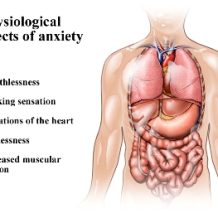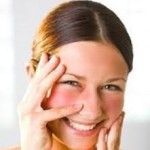Anxiety Symptoms

Have you ever found yourself waiting to attend an interview, or standing at a podium to deliver a big speech, when you suddenly feel your heart pounding, your palms sweaty, chillness running down your spine, trembling under your knees, blushing/flushing of your face/ears, your mouth drying up and your mind going completely blank despite rigorous preparations? These are certainly some symptoms of panic attack that you are facing at that moment.
An attendant waiting outside ICU room or a husband waiting outside the delivery room can face very anxious moments and can typically be seen walking restlessly, being hyperactive, worried, extremely tensed and irritable too. As the span of waiting time continues, the person going through these anxiety symptoms loses sleep and appetite, and feels exhausted, tired and fatigued.
A person or victim who has undergone a major trauma in life or have fallen a prey to a major mishap/accident is found to have the above mentioned symptoms in a protracted manner leading to serious physiological and psychological illness. They suffer from Post traumatic stress disorder symptoms which include insomnia (sleeplessness), nightmares, hallucinations, flashbacks and intense physical pain (chest pain, choking, nausea, diarrhoea, fainting, lack of appetite, frequent urination, weakness, sweating). At the emotional level, the person will have difficulties in concentrating or focusing on things/work, crying out without any apparent reasons, extreme mood swings, developing phobia to places, people, events, situations and avoiding those feeling of loneliness even when within a crowd, emotional numbness, loss of interest, all of which leading to depression
Children suffering from separation anxiety are likely to throw tantrums, cry continuously, refuse to go to bed, refusal to go to school and  become clingy with the parents or the care taker. Teens, when anxious tend to show symptoms of being shy, incredibly irritable, argumentative with parents, and have difficulty concentrating in homework or class work. They suffer from physical symptoms of headaches, stomach upsets, trembling, tensed muscles and general fatigue.
become clingy with the parents or the care taker. Teens, when anxious tend to show symptoms of being shy, incredibly irritable, argumentative with parents, and have difficulty concentrating in homework or class work. They suffer from physical symptoms of headaches, stomach upsets, trembling, tensed muscles and general fatigue.
Women are found to be more anxious than men and are more likely to develop anxiety disorders. It is attributed towards their biological changes including menstrual cycle, pregnancy, child birth and menopause. Such women exhibit anxiety symptoms such as heart palpitations, shortness of breath, dizziness, de-realization, exaggerated tension or worry, sleep disorders, headaches, fatigue, increased blood pressure, irritability and mental distractions
. Symptoms of people suffering from OCD (Obsessive compulsive disorder) anxiety type fall under one of the categories of washers (hand washing compulsions), checkers (repeatedly checking if the door is locked, oven is turned off), doubters (doubting if everything is done perfectly), counters (obsessed with number, colors, arrangements), hoarders (who keep hoarding unnecessary baggage for the fear of something bad happening if thrown away). Phobic or social anxiety disorders will exclude people suffering from it, to avoid the triggers (objects, places, people, events, social gatherings) that cause their anxiety and keeps them aloof and recluse.thl
Symptoms of people suffering from OCD (Obsessive compulsive disorder) anxiety type fall under one of the categories of washers (hand washing compulsions), checkers (repeatedly checking if the door is locked, oven is turned off), doubters (doubting if everything is done perfectly), counters (obsessed with number, colors, arrangements), hoarders (who keep hoarding unnecessary baggage for the fear of something bad happening if thrown away). Phobic or social anxiety disorders will exclude people suffering from it, to avoid the triggers (objects, places, people, events, social gatherings) that cause their anxiety and keeps them aloof and recluse.thl
